Sexuality: The Lyrics of Prince, 1980-1988
Prince Rogers Nelson is an enigma. Shrouded by a mythology of his own making, he exists now as a revered “artist”, a throwback to old school musicianship and showmanship. After thirty-six years of releasing music, his concerts continue to sell out and scores of singers and songwriters single him out as an influence. It’s almost easy to forget how strange and startlingly fresh Prince’s music felt when he appeared on the music scene. On the heels of Purple Rain‘s thirtieth anniversary, it’s fascinating to take another listen to Prince’s trailblazing work of the 1980’s. Pay close attention to his lyrical output from the key albums recorded between 1980 and 1988, and you’ll find a musician developing his views on sexuality, the pervading theme of much of his work. The almost-pornographic lyrics of his early-eighties albums give way, by decade’s end, to thoughtful ruminations on the correlation between lust and love.
Dirty Mind
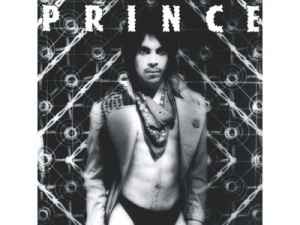
After two generally unremarkable R&B albums, For You (1978) and Prince (1979), the one-man band released Dirty Mind (1980). While his first two albums dabbled in themes of sex and gender role identity, Dirty Mind presents a clear, no-holds-barred account of the sexual freedom Prince longs for. From the opening lyrics of the title song to the final shouts in “Partyup” that end the album, Prince creates an aural landscape where the libido runs free. Various types of sex are described and celebrated. The rejected lover of “When You Were Mine” is so desperate to get back with his ex-girlfriend, he has no problem sharing a bed with her new lover.
I didn’t care.
I never was the kind to make a fuss
When he was there
Sleeping in between the two of us.
In 1980, this was edgy. Forget, for a moment, that Prince was a then relatively-unknown musician to mainstream America. He was an African-American musician playing an infectious blend of rock and soul during an era when pop and rock radio was still rigidly segregated. Furthermore, with his trench coat and bikini briefs look, he wasn’t going to get much love from Black radio either. He was a true outsider, writing and performing music that asked listeners to shake off the shackles of convention and give in to their dirty minds.
In “Head”, a young man meets a woman on her way to the altar. Although she cannot possible engage in coitus, she agrees to perform fellatio on him. Alas, her dress gets soiled. “Sister”, the album’s shortest and most disturbing track, details what can be construed as the joys of incest– it depends on how one interprets the meaning of the word “sister”. Even the most open-minded listener might cringe during this song. However, one track saves the album from being a complete exercise in sexual overindulgence.
“Uptown” is Dirty Mind‘s anthem, a manifesto celebrating complete liberation. Prince equates sexual freedom with individual freedom– the freedom to be one’s own person, unbound from the rules dictated by society at large. Uptown is Prince’s Utopia.
Where I come from
We don’t let society
Tell us how it’s supposed to be …
Everybody’s going uptown.
It’s where I wanna be.
Uptown, set your mind free.
Whereas the rest of the album is merely concerned with the physical pleasures of sex, with none of the psychological insight prevalent in his later work, “Uptown” hints at where Prince’s lyrics will eventually lead.
Controversy
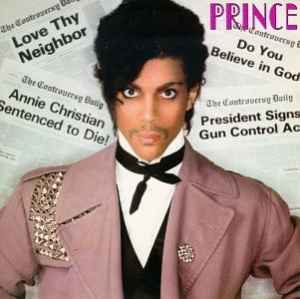
The lyrical themes of “Uptown” received a more thorough treatment in 1981’s Controversy. The title song constitutes Prince’s rebuttal to those who’d dare question his lifestyle.
I can’t understand all the things people say.
Am I black or white?
Am I straight or gay?
Prince basically tells the world not to worry about his gender identity, sexual ethics, or race. He concludes by chanting,
People call me rude.
I wish we all were nude.
I wish there was no black or white.
I wish there were no rules.
“Sexuality” is a call to unity for all of those who wish to live in complete freedom. Through the physical transcendence of sex, Prince implies we can all be truly free. Elsewhere, the pure lust of Dirty Mind rears its head on tracks such as “Do Me, Baby” (coitus), “Private Joy” (masturbation), and “Jack U Off” (what do you think?).
1999
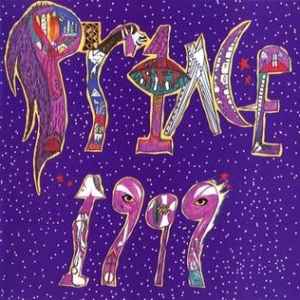
With the release of 1999 (1982), Prince, already the critics’ darling, gained widespread commercial acceptance for the first time. The title track and “Little Red Corvette” shot to the upper echelons of the pop music charts. With eleven songs spread over two lp’s (remember vinyl?), sex gets massive attention. However, Prince sounds, at times, frustrated with unadulterated, unattached carnal lust. There are cracks developing in his sexual utopia. The underlying tension of “Little Red Corvette”, a metaphor for the vagina, betrays its devil-may-care ambience.
Little red Corvette,
Baby, you’re much too fast.
Little red Corvette,
You need to find a love that’s gonna last.
In “Let’s Pretend We’re Married”, the artist announces,
Excuse me, but I need a mouth like yours
To help me forget the girl
Who just walked out my door.
“Automatic” and “Something In the Water (Does Not Compute)” reveal more direct frustrations. In the former, Prince reveals his love for his woman to be empty, full of hollow, almost mechanical declarations.
You ask me if I love you.
It’s automatic.
‘Cause every time you leave me
I die– that’s automatic too.
He describes himself as addicted to her. During the song’s climax, a cold, robotic woman’s voice announces, “I’m going to have to torture you now.” Against a backdrop of a scorching guitar solo, the sounds of crying and sobbing rise to the fore. It is a frightening moment, suggesting the depths of loneliness and despair.
“Something In the Water (Does Not Compute)” continues in this dark vein. The woman in this song refuses to let her lover know her in a truly emotional way. Prince, clearly in dire straits, promises,
I’ll buy you clothing.
I’ll buy you fancy cars.
But you got to talk to me, baby,
Tell me who you really are.
Purple Rain, Around The World In A Day, and Parade
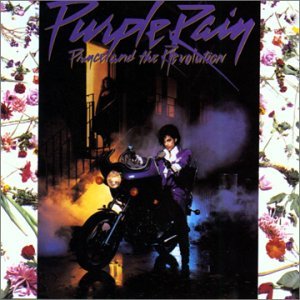
For the first time, simple carnal pleasure reveals itself as unfulfilling. Prince is looking for something more substantial. His next three albums detailed his search. The songs in Purple Rain (1984), Around the World in a Day (1985), and Parade (1986), recorded with The Revolution, straddle the fence between lust and love with increasingly fascinating results. Tracks such as “Darlin’ Nikki”, “Tambourine”, and “New Position” tread the terrain of Dirty Mind. However, “When Doves Cry”, “Condition of the Heart”, and “Kiss” reveal a man in search of emotional, as well as sexual, satisfaction. The sense of loss in all three albums is palpable. “Purple Rain” details a man’s sorrow over losing his lover. He wistfully hopes to see her again in the afterlife. “Sometimes it Snows in April” is a eulogy for a dear friend. The emotional resonance of these songs is undeniable. Sex is no longer of paramount importance. In fact, Around the World in a Day‘s “Temptation” ends with Prince announcing, “Love is more important than sex / Now I understand.”
Sign ‘O’ The Times
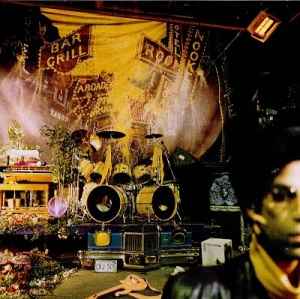
Sign ‘O’ the Times (1987) marked a watershed moment for Prince. Though he still wrote songs about sex, he did so with a newfound maturity. No longer are the songs mere sketches that superficially describe the joys of intercourse. There is shading and perspective. There is real intimacy. Most importantly, in the album’s best songs, there is a distinct desire for understanding.
Of course, the subject of lust is still represented. This is a Prince album, after all. “It”, “Hot Thing” and “U Got The Look” proudly carry on the tradition. However, even in these tracks, the lyrics are laced with humor and a bit of self-mockery. Consider “U Got the Look”:
U Got the look.
U must’ve took
A whole hour just to make up your face.
Closin’ time, ugly lights, everybody’s inspected.
But you are a natural beauty unaffected.
Did I say an hour?
My face is red,
I stand corrected.
Elsewhere, the lust-fests of earlier albums are replaced with songs such as “Slow Love”, a ballad that is genuinely romantic.
The gentle breeze,
It blows with ease.
Let’s take it slow,
Just like the wind blows.
In “Forever in My Life”, Prince sings,
There comes a time in every man’s life
When he gets tired of fooling around.
Juggling hearts in a three-ring circus
Will someday drive a body down to the ground.
Later, he admits,
There comes a road in every man’s journey
That he’s afraid to walk on his own …
You are my hero,
You are my future.
When I am with you
I have no past.
However, while Prince’s newfound allegiance to fidelity is striking, it is his ruminations on the darker aspects of love that prove most illuminating.
The aptly titled “Strange Relationship” details one man’s potentially violent feelings of attraction and revulsion for his partner.
I came and took your love,
I took your body.
I took what self-respect you ever had.
I took you for a ride and baby I’m sorry.
The more you love me, sugar,
The more it makes me mad.
Baby, I just can’t stand to see you happy.
But more than that,
I hate to see you sad.
Honey, if you left me
I just might do something rash.
What’s this strange relationship?
More than a “can’t-live-with-her-can’t-live-without-her” scenario, Prince refuses to fall back into typical “I’m the real victim here” territory. Indeed, he is brutally honest about his shortcomings.
Honesty also marks “I Could Never Take the Place of Your Man”. Sad lyrics belie a dance beat as a lonely woman, dumped by her lover, with one child and another on the way, tries to pick up a man at a disco. He turns her down, explaining, “I may be qualified for a one-night stand / But I could never take the place of your man.” When she asks him if they can be friends, he retorts, “Oh honey baby, that’s a dead end / You know and I know / That we wouldn’t be satisfied.”
Prince turning down sex. Imagine that.
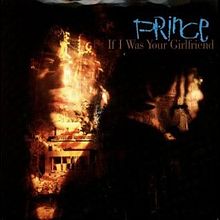
“If I Was Your Girlfriend” is Sign ‘O’ the Times‘, and perhaps Prince’s, greatest moment. The lyrics tell the story of a man desperate to experience the kind of intimacy with his woman that she shares with her girlfriends. From the opening words, Prince turns male/female gender assumptions inside-out.
If I was your girlfriend,
Would you remember
To tell me all of the things
You forgot when I was your man?
He wants to do all of the things with his partner that “real men” would never do. He is willing to express his femininity in an effort to experience the closeness he believes women experience with other women.
If I was your girlfriend,
Would you run to me if somebody hurt you?
Even if that somebody was me?
The singer describes the pleasures of making her breakfast, of helping her pick out her clothes, of going to the movies and crying together. “I just want to be,” he intones, “All of the things you are to me.” The song ends with Prince, in a frenzy, rhapsodizing on the ecstasy of two people becoming one:
We don’t have to make children to make love.
And we don’t have to make love to have an orgasm …
Would you let me see you naked then?
Would you let me give you a bath?
Would you let me tickle you so hard
You’d laugh and laugh?
Would you let me kiss you down there?
You know, down there where it counts?
I’ll do it so good, I swear
I’ll drink every ounce
And hold you tight and hold you long
And together we’ll stand the silence.
And we’ll try to imagine what it looks like.
Yeah, we’ll try to imagine
What silence looks like.
The album ends with “Adore”, an old-fashioned R&B love ballad in which Prince pledges his everlasting devotion to his beloved. He admits that, at first meeting, he only wanted her for sex. But, he fell in love. The song ends, in a chorus of angelic voices, with an unabashed declaration of monogamy.
I’ll give you my heart,
I’ll give you my mind.
I’ll give you my body,
I’ll give you my time.
For all time I am with you.
You are with me.
Lovesexy
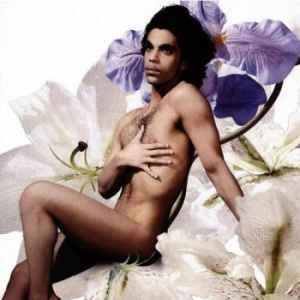
If one suspects that sex is Prince’s religion, then Lovesexy (1988), his next album, leaves no doubt. Consisting of a nine-song cycle, Prince frankly equates sex and love with God. While his music had always hinted at the transcendence of ecstasy, Lovesexy makes his views explicitly clear. In “Glam Slam”, he asserts, “This thing we got– it’s alive / It seems to transcend the physical.”
He’s still very interested in sex, as “Alphabet St.” proves; only now, sex fills him with a spiritual high akin to religious conversion. After revealing the emptiness of past escapades, “Anna Stesia” finds a broken Prince desperate to learn how to “love the right way.” His epiphany, that God’s love is manifested through physical intimacy, ends with a childlike rhyme, one of several allusions to the album’s assertion of spiritual and physical rebirth (see the album cover for another, less-than-subtle representation of this theme):
Love is God.
God is Love.
Girls and Boys
Love God above.
On the album’s title track, Prince utilizes sexual imagery to describe the holy ecstasy he now feels. The physical and the spiritual, the carnal and the sacred, are now intertwined and the gospel must be spread.
This feeling’s so good in every single way.
I want it morning, noon, and night of every day …
Anyone who’s ever touched it,
They don’t want nothing else.
And I got to tell the world.
I just can’t keep it to myself.
“When 2 R In Love” brings things to a climax, so to speak. Again, using erotic imagery, Prince imagines a paradise of sex and love. The first verse poetically depicts the physical act of love.
When 2 r in love,
Falling leaves will appear to them
Like slow motion rain.
When 2 r in love,
The speed of their hips
Can be faster
Than a runaway train.
However, by song’s end, Prince comes to a profound realization.
Bathe with me.
Let me touch your body
‘Til your river’s an ocean.
Bathe with me.
Let’s kiss with one synonymous notion
That nothing’s forbidden,
And nothing’s taboo,
When 2 r in love
Nothing forbidden. Nothing taboo. For one brief moment, the artist who has spent the previous eight years in search of physical liberation finds it within his own sense of spirituality. Love and sex have become one concept. Lovesexy.
Eight years after Dirty Mind, the theme of sexual freedom is still of supreme importance to Prince. However, his lyrics are on a different level by the time of Lovesexy. He has moved beyond the physical and entered the realm of the spiritual. Indeed, sex is no longer a physical act, but an essential experience of the soul intended to bring one closer to God. Prince knows maintaining this level of perspective will not be easy. Lovesexy‘s final lyrics, from “Positivity”, admit, “Hold on to your soul / We got a long way to go.”
Though he has continued to release albums at the rate of roughly one-per-year, Prince has never again reached the level of artistry and imagination he achieved during the period from 1980 – 1988. Over the course of eight albums, a fascinating and very public account of an artist struggling to reconcile the facets of his sexuality emerged. Lyrically, his work evolved from the profane to the profound. the ultimate results of his struggle are known only to Prince. Fortunately, for us, the music he created is available to all.
Works Cited
Prince. Controversy. Warner Bros. Records: 1981.
—. Dirty Mind. Warner Bros. Records: 1980.
—. Lovesexy. Warner Bros. Records: 1988.
—. 1999. Warner Bros. Records: 1982.
—. Sign ‘O’ the Times. Warner Bros. Records: 1987.
Prince and the Revolution. Around the World in a Day. Warner Bros. Records: 1985.
—. Parade. Warner Bros. Records: 1986.
—. Purple Rain. Warner Bros. Records: 1984.
What do you think? Leave a comment.











For me, Prince’s musical genius peaked at “Around the world in a day” album. His music after that has been somewhat hit and miss.
Parade & Sign o’ The Times are my favourites by him so I respectfully disagree. It’s been much, much more miss than hit since those though.
Prince is amazing.Mozart of pop.
I have worked as crew for Prince in 2001. Although I knew some of his music from the 80s, I wasn’t a big fan of him. I’m still not a fan, but I’ll be the first to admit he’s a genius and probably the most impressive artist I ever saw – and trust me, I’ve seen a lot of them when it used to be my job (which includes, amongst others, Michael Jackson, Paul McCartney and Roger Waters).
You’ve put me in the mood to listen to some Prince, now.
Saw him at Leeds Arena recently. Honestly one of the best gigs I’ve ever seen in my life. For the love of god, go see him if you haven’t done so already.
His performance in Glasgow few weeks ago was hands down the best live show I’ve ever seen (just narrowly pipping Springsteen at Hampden last year to that honour). Absolutely superb, the man’s a genius.
I never really thought of myself as a Prince fan but he is a great musician.
the man is a god.
that is all
I am not what you would call a Prince fan by any means, but I have had to listen to him for my entire life because my mum is CRAZY about him.
Prince is mindblowing. He is the Justin Bieber of the 80s.
this is quite an insult comparison!
I think he did his best work long ago.
Prince is so so good! I’d love to see him working with Frank Ocean, they would harmonise like nothing on this earth.
beautiful article. I find a lot of great articles on this website that I love reposting it on our site (naturalrecordsstudios.com). thanks for your articles.
I love this article! As a child of the ’90s, I never really considered myself a Prince fan but I remember the days of my mother blasting When Doves Cry while cleaning the house. The article gives great context for the time the music was produced. As I’ve only experienced Prince after his initial success, I never truly understood how truly “edgy” his music must have been to the audience he was producing for.
The greatest living musical superstar.
Period.
I have very special memories associated with the song Purple Rain… Probably more than any other song.
Prince of today probably won’t be hitting the pop charts like he did in the past, but gawd, the man is a helluva musician. Personally, I’m looking forward to his new music.
He’s still great live, but as a songwriter I’m afraid he’s past it. Would love to be proved wrong though.
Wonderful article on the sexuality of Prince’s lyrics. It helps to appreciate he work even more for its complexities and use of metaphors.
Prince, he’s a legend. Such an awesome musician! Thank you Prince for sharing your wonderful talent!!
Miss this man! A nice perspective of his growth in the 80s – pretty dead on as we were all growing and funking along with him. Most of his late 90s and 00 output was excellent but not as ‘personal’ as he took different approaches and expanded his craft. His 89-92 output with the NPG took a different approach as I feel he was on a whole different plateau as a man who wanted control of his destiny, his craft, and his soul, which he shared so beautifully with us his fans. The music was introspective, message-driven, love beyond sex driven, and have a good time without selling your soul music.
Even though it was officially released in 1994, the Black Album had bootlegged copies floating around madly in 1988 which affects your time period here. It was basically the ‘evil’ version of Lovesexy and he pulled it from shelves. His alter-ego Camille was on it and the album dripped with funk and repressed sexuality. Erotic City was all over the radio, and clubs, and he even did it at shows. All of it seemed like this repressed sexuality in him was crashing and burning before emerging as a more monogamous devoted man in his 30s.